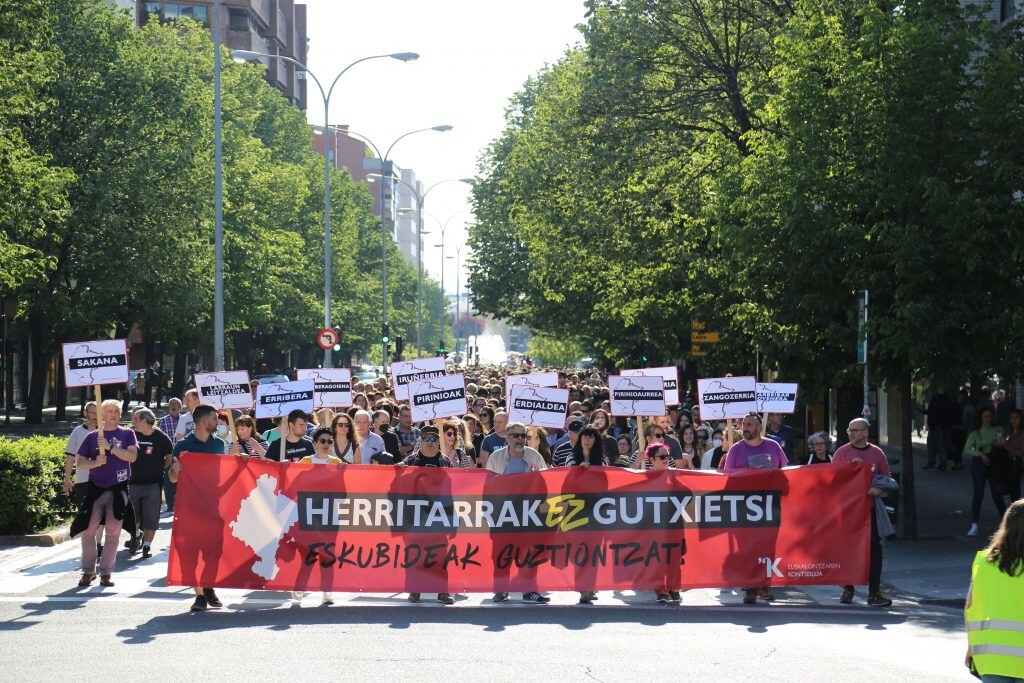
In each call for the "mixed zone" of Navarra, the score given to both the Basque and foreign languages will be determined individually, and in the non-Basque zone the Basque will not be valued. The Council of the Basque Country has framed this decision in "the Basque, reactionary and retrograde attitude" of the Government of Navarra.

It has been five years since the Superior Court of Justice of Navarre annulled several sections of the Order of Merit, and finally the Government of Navarre has approved the new one. The Basque country has a clear reading: the new decree violates the rights of Vasco-speakers and denies recognition to the Basque country. The Council of Euskalgintza and the Observatory of Linguistic Rights have denounced that, although the judgment of the Superior Court of Justice of Navarra (TSJN) of 2019 was to cover the vacuum generated, the original measures of the Foral Decree of 2017 have finally been "emptied of content". Euskalgintza described the new text as "serious step backwards": "It is an unacceptable setback for the council and puts this decision within the framework of the reactionary and retrograde Euskarafob attitude of the government," he added.
Foral Decree 103/2017, which permitted the assessment of Euskera's knowledge as merit in the mixed, non-Basque area and in the squares of the central services of the Administration, establishes the Law. The Superior Court of Justice of Navarre (TSJN) annulled in October 2019 Articles 35 and 39 and the fourth transitional provision for considering them "discriminatory" and "abusive". The decree passed five years later represents a step backwards in the normalization of the Basque country. "This decree has been designed at the orders of some parties and lobbyists, who have gone beyond what was dictated by the 2019 ruling, when it comes to reducing the weight of the Basque Country," said Berria Agurne Gaubeka, director of the Observatory on Linguistic Rights.
The Geroa Bai party also criticises the text, but also sees its advantages: "It has large deficits, but it partly solves the current situation."
What does the Order of Merits entail?
According to the general rule, each call will determine the score given to Euskera and foreign languages (French, English and German), once the specific needs of each post have been analysed. However, the decree does not specify in which position the knowledge of the Basque and the other three languages will be valued. The decree establishes the possibility of expanding the knowledge of the Basque Country to the mixed area, but not in a generic way, "when it has to do with the job and its specific characteristics". In this sense, an "individualized assessment" will be performed in each call. The knowledge of Euskera will not be valued in the non-Basque area.
Until now, it has been possible to value the knowledge of the Basque Country in the "non-Basque" field established by law for some jobs. The new decree also abolishes this, but the foreign languages of Navarre – German, English and French – can be assessed. As for the "mixed" zone, in 1994 the knowledge of the Basque country was valued at between 10% and 5%, starting in 2009 in some jobs 3% and in others 6%. Now, however, this minimal and widespread assessment has also been ruled out, and only in certain jobs will the knowledge of the Basque country be valued.
The Council has denounced that the new Order of Merits provides for more regressive measures than those not annulled by the Superior Court of Justice of Navarra: "This makes it clear that the purpose of the new decree is not to resolve what was annulled by the court, but that it has every intention of continuing to entrench the rights of the Vasco-Speakers and, ultimately, perpetuating the discrimination of minority speakers and languages."
The Council and the Observatory lay the foundation for the zoning brought about by the Vascuence Act of 1986: "[Zoning] which allows the approval of such a decree. In fact, through the zoning of the time it was determined that in Navarra there are citizens of two levels, depending on the place of residence, some citizens are recognized all the linguistic rights and others are not." The Basque cultural movement has called for a new Law of the Vascuence that extends the Basque Government to all Navarra.El. The Navarro Council of Vascuence has on several occasions urged the Government of Navarra to amend the Law of the Vascuence of 1986 and to formalize the Basque Country throughout Navarre, including the declaration approved on 16 September 2022, which was also endorsed and signed.
In addition, Euskalgintza stressed that "it is time to change the parameters" and stressed that "it must be done". "Let us not talk about scores or merits, let us talk about the right of citizens to act in their language with the administration. It is not something abstract, we are talking about the right to act in Basque in the administration and to receive answers in the same language".